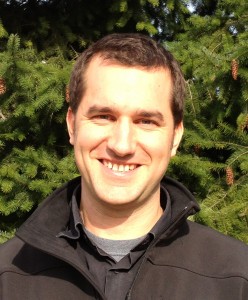This blog is the research diary for my M.Sc. degree at the University of British Columbia Faculty of Forestry. It documents my learning process and provides my results as I produce them. Although I have a good foundation in forest ecology and the diversity of climates in British Columbia, I’m new to a lot of the other pre-requisites to a climate change research project: weather station data, multivariate statistical methods, and global climate science. I am very appreciative of any comments, suggestions, or critiques that readers are willing to offer.
About the blog author: Colin Mahony
I am a registered professional forester with ten years of experience as a forestry consultant in British Columbia. I’ve worked in the field in several regions of the province, especially the coast, the Cariboo-Chilcotin, and the West Kootenays. It has become clear to me that climate change is an unprecedented challenge to BC’s forests, and also that foresters have a responsibility to mitigate and adapt to climate change impacts in the forest on behalf of society. I hope my research will provide information to help with these efforts.
My Project
The objective of my research is to understand simulated climate change projections for the next century in terms of the different climates that exist in British Columbia today and how they have changed over the last century. One of the core tools of my research is the Biogeoclimatic Ecosystem Classification (BEC), which provides a detailed classification and map of the climates of British Columbia. In addition to using BEC to support my research, I’m also trying to find ways of adapting BEC to a changing climate.
My research questions are:
- To what extent do recent and projected climate conditions in various regions of BC deviate from historic variations over the past century?
- Are these projected conditions analogous to climatic conditions currently found elsewhere in the province, or are they entirely novel?
My Committee
- Dr. Sally Aitken (Research Supervisor). Department of Forest Sciences, University of British Columbia
- Dr. Suzanne Simard (Co-supervisor). Department of Forest Sciences, University of British Columbia
- Dr. Tongli Wang. Associate Director, Centre of Forest Conservation Genetics, UBC Department of Forest Sciences
- Dr. Alex Cannon. Adjunct Professor, Department of Earth, Ocean, and Atmospheric Sciences
Why “the Seasons Alter”?
…Therefore the winds, piping to us in vain,As in revenge, have sucked up from the seaContagious fogs, which falling in the landHave every pelting river made so proudThat they have overborne their continents.The ox hath therefore stretched his yoke in vain,The ploughman lost his sweat, and the green cornHath rotted ere his youth attained a beard.The fold stands empty in the drownèd field,And crows are fatted with the murrain flock.The nine-men’s-morris is filled up with mud,And the quaint mazes in the wanton greenFor lack of tread are undistinguishable.The human mortals want their winter here.No night is now with hymn or carol blessed.Therefore the moon, the governess of floods,Pale in her anger, washes all the air,That rheumatic diseases do abound.And thorough this distemperature we seeThe seasons alter: hoary-headed frostsFall in the fresh lap of the crimson rose,And on old Hiems’ thin and icy crownAn odorous chaplet of sweet summer budsIs, as in mockery, set. The spring, the summer,The childing autumn, angry winter changeTheir wonted liveries, and the mazèd world,By their increase, now knows not which is which.And this same progeny of evils comesFrom our debate, from our dissension.We are their parents and original.
